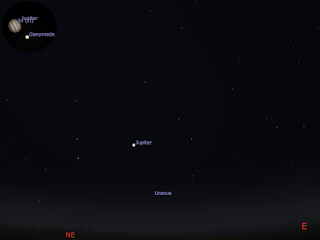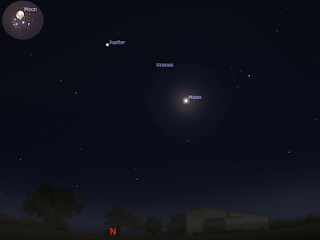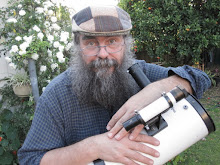Monday, October 30, 2023
Thursday November 2 to Thursday November 9
The Last Quarter Moon is Sunday, November 5.The Moon is at apogee, when it is furthest from the Earth, on the 7th.
The bright satellite Titan is close to Saturn, making a nice view.
Similar views will be seen from the rest of Australia at the equivalent
local time (90 minutes after sunset).
Io and its shadow are passing over Jupiter at this time and Io will exit Jupiter's disk in around 40 minutes.
Similar views will be seen from the rest of Australia at the equivalent local time (90 minutes after sunset).
Between the bright star Canopus and the Southern Cross are another wealth of binocular objects to discover.
Elsewhere in Australia will see a similar view at the equivalent time (90 minutes after sunset).
Mercury is lost in the morning twilight.
Venus is high in the morning twilight, it will now sink towards the horizon but will remain easily visible for all of November.
Mars is lost in the twilight.
Jupiter rises around astronomical twilight and is now well visible in the late evening sky. It is at opposition, when it is biggest and brightest as seen from Earth, on the 3rd.
Saturn is past opposition but is still bright and a worthwhile telescopic object.
Star Map via Virtual sky. Use your mouse to scroll around and press 8 when your pointer is in the map to set to the current time.
Cloud cover predictions can be found at SkippySky.
Here is the near-real time satellite view of the clouds (day and night) http://satview.bom.gov.au/
Labels: weekly sky
Saturday, October 28, 2023
Partial Lunar Eclipse, Western Australia (Morning October 29)
From the rest of Australia, the Moon will have set before any significant amount of eclipse happens. A tiny sliver of the eclipse is seen from Adelaide just before the Moon sets.
Labels: eclipse, lunar eclipse, Moon
Friday, October 27, 2023
Occultation Pleiades 30-31 October 2023.
| Morning
sky on Tuesday, October 31 as seen from Adelaide at 00:40 ACDST, (click
to embiggen). The moon is just about to cover the star Merope in the
Pleiades. The inset is the binocular view of the moon at this time (click to embiggen). | Morning sky on Tuesday, October 31 as seen from Melbourne at 01:00 AEDST, (click to embiggen). The moon is just about to cover the star Merope in the Pleiades. The inset is the binocular view of the moon at this time (click to embiggen). | Evening sky on Monday, October 30 as seen from Perth at 23:00 AWST, (click to embiggen). The moon is just about to cover the star Atlas in the Pleiades. The inset is the binocular view of the moon at this time (click to embiggen). |
| Merope DB | Merope RD | Alcyone DB | Alcyone RD | |
| Adelaide ACDST | 00:43 | 1:15 | 1:33 | 1:57 |
| Brisbane AEST | 00:30 | 1:27 | 1:24 | 2:11 |
| Canberra AEDST | 1:13 | 2:19 | 2:03 | 3:04 |
| Darwin ACST | - | - | - | - |
| Hobart AEDST | 1:05 | 2:15 | 1:52 | 2:59 |
| Melbourne AEDST | 1:07 | 2:09 | 1:55 | 2:53 |
| Perth AWST (30th) | 23:10* | 23:44* | - | - |
| Sydney AEDST | 1:17 | 2:24 | 2:07 | 3:09 |
DB - disappear bright limb, RD - reappear dark limb.
* In Perth the Moon misses Merope and Alcyone, but passes over the bight star Atlas instead on the late evening of the 30th.
It’s best to set up around 30 minutes before the occultation so you can get oriented in the sky and don’t miss the beginning while fussing with equipment.
Cloud cover predictions can be found at SkippySky.
Here is the near-real time satellite view of the clouds (day and night) http://satview.bom.gov.au/
Labels: binoculars, Moon, Occultation, Pleiades, telescope
Tuesday, October 24, 2023
Thursday October 26 to Thursday November 2
The Full Moon is Sunday, October 29. There is a partial lunar eclipse really only visible in WA as the moon sets on the morning of the 29th. The Moon is at perigee, when it is closest to the earth, on the 26th.
Similar views will be seen from the rest of Australia at the equivalent
local time (90 minutes after sunset).
Similar views will be seen from the rest of Australia at the equivalent local time (an hour before local midnight).
about 30 minutes later the moon will cover the brightest star of the Pleiades, Alcyone.
From Brisbane, Merope is covered at 00:30 AEST
From Melbourne, Merope is covered at 01:07 AEDST
From Perth, Atlas is covered at 23:10 AWST on the 30th.
From Darwin, the Moon grazes the outer edges of the Pleiades.
Between the bright star Canopus and the Southern Cross are another wealth of binocular objects to discover.
Elsewhere in Australia will see a similar view at the equivalent time (90 minutes after sunset).
Mercury is lost in the morning twilight.
Venus is high and furthest from the Sun on the 24th, it will now sink towards the horizon.
Mars is lost in the twilight.
Jupiter rises around astronomical twilight and is now well visible in the late evening sky. It is close to the Moon on the 29th.
Saturn is past opposition but is still bright and a worthwhile telescopic object.
Star Map via Virtual sky. Use your mouse to scroll around and press 8 when your pointer is in the map to set to the current time.
Cloud cover predictions can be found at SkippySky.
Here is the near-real time satellite view of the clouds (day and night) http://satview.bom.gov.au/
Labels: weekly sky
Friday, October 20, 2023
International Observe the Moon Night, Saturday October 21, 2023
International Observe the Moon Night is on Saturday October 21. The moon is almost First Quarter, which is good for crater viewing, there is a lot to see with the unaided eye or binoculars.
location maps from NASA showing where local events are located are available at the link.
 The moon is one day away from First quarter, so there will be a lot of interesting carters visible on the moons limb, the sunlight/dark boundary.
The moon is one day away from First quarter, so there will be a lot of interesting carters visible on the moons limb, the sunlight/dark boundary.At this time the Moon is at maximum libration, with the normally hidden Mare Humboldtanium now visible in binoculars or telescopes.While the moon keeps on face towards the earth, changes in perspective from the Earth and Moons relative positions in their orbits means that sometimes we can see bits of the Moon normally hidden, this is libration.
Other features visible are the very obvious Aristoteles crater with the slightly smaller crater Eudoxus, these two form a distinctive pair. Towards the centre is Ptolemaeus crater, which is joined to the rim of the crater Alphonsus by a section of rugged, irregular terrain, and these form a prominent chain with Arzachel to the south. On the dark/light boundary is the Sea of Serenity, where Apollo 17 landed. See the map to the above left, click to embiggen.
PDF Moon maps from NASA suitable for printing are available at the link.
There are many ways to observe the Moon. Unaided eye, binoculars, telescope. No matter what approach you choose, it will be well worth it to go out and just look up.
Labels: international Observe the Moon Night, Moon, public outreach
Monday, October 16, 2023
Thursday October 19 to Thursday October 26
The First Quarter Moon is Sunday, October 22. The Moon is at perigee, when it is closest to the earth, on the 26th.
Similar views will be seen from the rest of Australia at the equivalent
local time (90 minutes after sunset).
Similar views will be seen from the rest of Australia at the equivalent local time (an hour before local midnight).
Between the bright star Canopus and the Southern Cross are another wealth of binocular objects to discover.
Elsewhere in Australia will see a similar view at the equivalent time (90 minutes after sunset).
Mercury is lost in the morning twilight.
Venus is high and is leaving the bright star Regulus behind. Venus is furthest from the Sun on the 24th.
Mars is lost in the twilight.
Jupiter is rising around astronomical twilight and is now well visible in the late evening sky.
Saturn is past opposition but is still bright and a worthwhile telescopic object. Saturn is close to the waxing Moon on the 24th.
Star Map via Virtual sky. Use your mouse to scroll around and press 8 when your pointer is in the map to set to the current time.
Cloud cover predictions can be found at SkippySky.
Here is the near-real time satellite view of the clouds (day and night) http://satview.bom.gov.au/
Labels: weekly sky
Wednesday, October 11, 2023
Bright ISS passes, 12-16 October, 2023
| The ISS as seen from Melbourne on the evening of Sunday 15 October at 18:48 AEDST. Simulated in Stellarium (the ISS will actually be a bright dot). Click to embiggen. | The ISS as seen from Adelaide on the evening of Sunday 15 October at 19:08 ACDST. Simulated in Stellarium (the ISS will actually be a bright dot). Click to embiggen. | The ISS as seen from Perth on the evening of Sunday 15 October at 19:26 AWST. Simulated in Stellarium (the ISS will actually be a bright dot). Click to embiggen. |
| All sky chart showing local times from Heavens Above for Sunday 15 October for Melbourne. | All sky chart showing local times from Heavens Above for Sunday 15 October for Adelaide. | All sky chart showing local times from Heavens Above for Sunday 15 October for Perth. |
Over the next few days
there are a series
of bright ISS passes in
the late evening twilight/early evening and the early morning. The ISS passes close to the several bright stars. For several sites the ISS passes through Scorpius (Melbourne very close to Antares on the 14th, Adelaide, Brisbane, Perth, Melbourne, Hobart on the 15th, Sydney on the 13th) or very close to Saturn (Brisbane 12th, Adelaide, Perth, Melbourne, on the 13th, Hobart very close on the 16th).
The following tables are from data provided from Heavens Above.
Particularly impressive passes are highlighted in yellow, passes entering the shadow in blue.
Passes from Adelaide (ACDST)
| Date | Brightness | Start | Highest point | End | Pass type | ||||||
| (mag) | Time | Alt. | Az. | Time | Alt. | Az. | Time | Alt. | Az. | ||
| 11 Oct | -3.5 | 05:19:08 | 15° | SW | 05:21:52 | 72° | SE | 05:25:16 | 10° | NE | visible |
| 12 Oct | -2.2 | 04:33:52 | 36° | ESE | 04:33:52 | 36° | ESE | 04:36:37 | 10° | ENE | visible |
| 12 Oct | -2.1 | 06:07:36 | 10° | W | 06:09:54 | 17° | NW | 06:12:11 | 10° | N | visible |
| 12 Oct | -2.8 | 21:09:58 | 10° | NW | 21:12:15 | 40° | NW | 21:12:15 | 40° | NW | visible |
| 13 Oct | -2.8 | 05:22:01 | 30° | NNW | 05:22:01 | 30° | NNW | 05:24:37 | 10° | NNE | visible |
| 13 Oct | -3.3 | 20:21:43 | 10° | NNW | 20:24:55 | 41° | NE | 20:27:35 | 14° | ESE | visible |
| 13 Oct | -0.8 | 21:59:10 | 10° | W | 22:00:36 | 17° | WSW | 22:00:36 | 17° | WSW | visible |
| 14 Oct | -1.9 | 21:10:01 | 10° | W | 21:13:05 | 31° | SW | 21:15:28 | 15° | SSE | visible |
| 15 Oct | -3.0 | 20:21:04 | 10° | WNW | 20:24:24 | 56° | SW | 20:27:48 | 10° | SE | visible |
| 15 Oct | -0.4 | 22:01:16 | 10° | SSW | 22:01:46 | 10° | SSW | 22:02:16 | 10° | SSW | visible |
| 16 Oct | -0.7 | 21:10:53 | 10° | WSW | 21:12:52 | 14° | SSW | 21:14:51 | 10° | S | visible |
| 17 Oct | -1.1 | 20:21:17 | 10° | W | 20:23:58 | 21° | SSW | 20:26:42 | 10° | SSE | visible |
| 19 Oct | -0.5 | 20:22:38 | 10° | SW | 20:23:35 | 11° | SSW | 20:24:31 | 10° | S | visible |
Passes from Brisbane (AEST)
| Date | Brightness | Start | Highest point | End | Pass type | ||||||
| (mag) | Time | Alt. | Az. | Time | Alt. | Az. | Time | Alt. | Az. | ||
| 11 Oct | -0.5 | 03:17:18 | 10° | SSE | 03:18:39 | 12° | SE | 03:19:59 | 10° | ESE | visible |
| 11 Oct | -1.0 | 19:52:49 | 10° | WNW | 19:53:33 | 15° | WNW | 19:53:33 | 15° | WNW | visible |
| 12 Oct | -3.5 | 04:03:53 | 10° | SW | 04:07:13 | 70° | SE | 04:10:35 | 10° | NE | visible |
| 12 Oct | -3.9 | 19:04:19 | 10° | NW | 19:07:40 | 74° | NE | 19:09:13 | 30° | SE | visible |
| 13 Oct | -2.0 | 03:19:00 | 32° | SE | 03:19:00 | 32° | SE | 03:21:49 | 10° | ENE | visible |
| 13 Oct | -3.0 | 18:16:12 | 10° | NNW | 18:19:15 | 33° | NE | 18:22:20 | 10° | ESE | visible |
| 13 Oct | -0.8 | 19:53:51 | 10° | W | 19:56:02 | 16° | SW | 19:57:35 | 13° | S | visible |
| 14 Oct | -2.5 | 04:07:28 | 25° | NNW | 04:07:28 | 25° | NNW | 04:09:41 | 10° | N | visible |
| 14 Oct | -1.6 | 19:04:24 | 10° | WNW | 19:07:21 | 28° | SW | 19:10:21 | 10° | SSE | visible |
| 15 Oct | -3.0 | 18:15:24 | 10° | NW | 18:18:43 | 56° | SW | 18:22:05 | 10° | SSE | visible |
| 16 Oct | -0.3 | 19:06:40 | 10° | SW | 19:07:07 | 10° | SW | 19:07:35 | 10° | SSW | visible |
Passes from Darwin (ACT)
| Date | Brightness | Start | Highest point | End | Pass type | ||||||
| (mag) | Time | Alt. | Az. | Time | Alt. | Az. | Time | Alt. | Az. | ||
| 11 Oct | -1.6 | 05:58:46 | 10° | SSW | 06:01:47 | 30° | SE | 06:04:47 | 10° | ENE | visible |
| 11 Oct | -3.4 | 19:16:19 | 10° | NNW | 19:19:29 | 42° | NE | 19:22:41 | 10° | SE | visible |
| 12 Oct | -0.6 | 05:11:22 | 10° | SSE | 05:13:18 | 14° | SE | 05:15:15 | 10° | E | visible |
| 12 Oct | -0.7 | 20:05:34 | 10° | W | 20:07:41 | 16° | SW | 20:09:49 | 10° | S | visible |
| 13 Oct | -3.5 | 05:58:15 | 10° | SW | 06:01:31 | 47° | NW | 06:04:45 | 10° | NNE | visible |
| 13 Oct | -1.9 | 19:16:05 | 10° | WNW | 19:19:09 | 33° | SW | 19:22:14 | 10° | SSE | visible |
| 14 Oct | -3.4 | 05:10:30 | 16° | SSW | 05:13:03 | 65° | SE | 05:16:22 | 10° | NE | visible |
| 15 Oct | -1.0 | 04:26:06 | 18° | E | 04:26:06 | 18° | E | 04:27:22 | 10° | ENE | visible |
| 15 Oct | -1.6 | 06:00:21 | 10° | WNW | 06:00:57 | 10° | WNW | 06:01:32 | 10° | NW | visible |
| 16 Oct | -1.4 | 05:14:40 | 13° | N | 05:14:40 | 13° | N | 05:15:08 | 10° | N | visible |
Passes from Hobart (AEDST)
| Date | Brightness | Start | Highest point | End | Pass type | ||||||
| (mag) | Time | Alt. | Az. | Time | Alt. | Az. | Time | Alt. | Az. | ||
| 11 Oct | -2.7 | 04:16:10 | 43° | E | 04:16:10 | 43° | E | 04:18:40 | 10° | ENE | visible |
| 11 Oct | -2.0 | 05:49:22 | 10° | W | 05:51:40 | 17° | NW | 05:53:57 | 10° | N | visible |
| 12 Oct | -2.6 | 05:03:53 | 27° | NNW | 05:03:53 | 27° | NNW | 05:06:22 | 10° | NNE | visible |
| 13 Oct | -3.1 | 20:54:37 | 10° | NNW | 20:57:36 | 34° | NE | 20:57:36 | 34° | NE | visible |
| 14 Oct | -2.3 | 20:06:44 | 10° | N | 20:09:21 | 21° | NE | 20:11:59 | 10° | E | visible |
| 14 Oct | -2.9 | 21:42:29 | 10° | WNW | 21:45:29 | 52° | WSW | 21:45:29 | 52° | WSW | visible |
| 15 Oct | -3.8 | 20:53:48 | 10° | WNW | 20:57:13 | 88° | SSW | 20:59:54 | 16° | SE | visible |
| 15 Oct | -0.9 | 22:31:27 | 10° | WSW | 22:32:50 | 18° | SW | 22:32:50 | 18° | SW | visible |
| 16 Oct | -3.6 | 20:05:16 | 10° | NW | 20:08:36 | 55° | NE | 20:11:58 | 10° | ESE | visible |
| 16 Oct | -1.8 | 21:42:26 | 10° | W | 21:45:30 | 30° | SSW | 21:46:52 | 22° | SSE | visible |
| 17 Oct | -2.4 | 20:53:26 | 10° | W | 20:56:41 | 40° | SSW | 20:59:57 | 10° | SE | visible |
| 17 Oct | -1.0 | 22:31:31 | 10° | SW | 22:33:29 | 18° | SSW | 22:33:29 | 18° | SSW | visible |
| 18 Oct | -3.1 | 20:04:30 | 10° | WNW | 20:07:52 | 60° | SSW | 20:11:17 | 10° | SE | visible |
| 18 Oct | -1.3 | 21:42:25 | 10° | WSW | 21:45:07 | 21° | S | 21:46:57 | 15° | SSE | visible |
| 19 Oct | -1.5 | 20:53:15 | 10° | WSW | 20:56:08 | 25° | SSW | 20:59:03 | 10° | SE | visible |
| 19 Oct | -1.0 | 22:31:08 | 10° | SW | 22:33:07 | 18° | S | 22:33:07 | 18° | S | visible |
| 20 Oct | -1.9 | 20:04:03 | 10° | W | 20:07:09 | 31° | SSW | 20:10:16 | 10° | SE | visible |
| 20 Oct | -1.2 | 21:42:07 | 10° | SW | 21:44:38 | 19° | S | 21:46:16 | 14° | SE | visible |
| 20 Oct | -0.2 | 23:19:04 | 10° | SW | 23:19:08 | 10° | SW | 23:19:08 | 10° | SW | visible |
Passes from Melbourne (AEDST)
| Date | Brightness | Start | Highest point | End | Pass type | ||||||
| (mag) | Time | Alt. | Az. | Time | Alt. | Az. | Time | Alt. | Az. | ||
| 11 Oct | -1.3 | 04:16:10 | 24° | SE | 04:16:10 | 24° | SE | 04:18:26 | 10° | E | visible |
| 11 Oct | -3.1 | 05:49:08 | 10° | WSW | 05:52:20 | 37° | NW | 05:55:30 | 10° | NNE | visible |
| 12 Oct | -3.9 | 05:03:53 | 70° | WNW | 05:03:58 | 71° | NW | 05:07:22 | 10° | NE | visible |
| 12 Oct | -1.2 | 21:41:34 | 10° | NW | 21:42:15 | 15° | NW | 21:42:15 | 15° | NW | visible |
| 13 Oct | -1.7 | 05:52:01 | 12° | NW | 05:52:01 | 12° | NW | 05:53:19 | 10° | NNW | visible |
| 13 Oct | -3.7 | 20:53:09 | 10° | NW | 20:56:28 | 56° | NE | 20:57:35 | 35° | ESE | visible |
| 14 Oct | -2.8 | 20:05:01 | 10° | NNW | 20:08:01 | 29° | NE | 20:11:02 | 10° | ESE | visible |
| 14 Oct | -1.8 | 21:41:41 | 10° | W | 21:44:44 | 29° | SSW | 21:45:28 | 27° | S | visible |
| 15 Oct | -2.7 | 20:52:43 | 10° | WNW | 20:56:02 | 47° | SW | 20:59:22 | 10° | SE | visible |
| 15 Oct | -0.3 | 22:32:00 | 10° | SW | 22:32:51 | 12° | SSW | 22:32:51 | 12° | SSW | visible |
| 16 Oct | -3.7 | 20:03:58 | 10° | NW | 20:07:22 | 86° | SW | 20:10:48 | 10° | SE | visible |
| 16 Oct | -0.8 | 21:42:22 | 10° | WSW | 21:44:32 | 16° | SSW | 21:46:42 | 10° | SSE | visible |
| 17 Oct | -1.2 | 20:52:56 | 10° | W | 20:55:37 | 21° | SSW | 20:58:21 | 10° | SSE | visible |
| 18 Oct | -1.8 | 20:03:39 | 10° | W | 20:06:45 | 31° | SSW | 20:09:52 | 10° | SSE | visible |
| 18 Oct | -0.4 | 21:43:55 | 10° | SSW | 21:44:20 | 10° | SSW | 21:44:45 | 10° | S | visible |
| 19 Oct | -0.7 | 20:53:40 | 10° | SW | 20:55:15 | 13° | SSW | 20:56:50 | 10° | S | visible |
| 20 Oct | -0.9 | 20:03:54 | 10° | WSW | 20:06:10 | 16° | SSW | 20:08:26 | 10° | SSE | visible |
Passes from Perth (AWST)
| Date | Brightness | Start | Highest point | End | Pass type | ||||||
| (mag) | Time | Alt. | Az. | Time | Alt. | Az. | Time | Alt. | Az. | ||
| 11 Oct | -2.9 | 04:22:06 | 10° | SW | 04:25:24 | 52° | SE | 04:28:42 | 10° | ENE | visible |
| 11 Oct | -1.8 | 19:25:23 | 10° | N | 19:26:36 | 16° | NNE | 19:26:36 | 16° | NNE | visible |
| 12 Oct | -1.7 | 03:36:52 | 28° | SE | 03:36:53 | 28° | SE | 03:39:53 | 10° | E | visible |
| 12 Oct | -2.3 | 05:10:53 | 10° | WSW | 05:13:29 | 20° | NW | 05:16:04 | 10° | N | visible |
| 12 Oct | -2.9 | 20:12:29 | 10° | NW | 20:15:17 | 50° | W | 20:15:17 | 50° | W | visible |
| 13 Oct | -3.3 | 04:25:02 | 40° | NW | 04:25:08 | 40° | NW | 04:28:19 | 10° | NNE | visible |
| 13 Oct | -3.8 | 19:23:59 | 10° | NW | 19:27:19 | 67° | NE | 19:30:36 | 11° | SE | visible |
| 13 Oct | -0.3 | 21:02:44 | 10° | WSW | 21:03:36 | 12° | SW | 21:03:36 | 12° | SW | visible |
| 14 Oct | -1.1 | 20:13:02 | 10° | W | 20:15:38 | 20° | SW | 20:18:15 | 10° | SSE | visible |
| 15 Oct | -2.0 | 19:23:47 | 10° | WNW | 19:26:54 | 34° | SW | 19:30:03 | 10° | SSE | visible |
| 17 Oct | -0.7 | 19:24:43 | 10° | WSW | 19:26:33 | 14° | SSW | 19:28:23 | 10° | S | visible |
Passes from Sydney (AEDST)
| Date | Brightness | Start | Highest point | End | Pass type | ||||||
| (mag) | Time | Alt. | Az. | Time | Alt. | Az. | Time | Alt. | Az. | ||
| 11 Oct | -1.4 | 04:16:10 | 20° | S | 04:17:16 | 23° | SE | 04:20:04 | 10° | E | visible |
| 11 Oct | -2.8 | 05:50:58 | 10° | WSW | 05:54:02 | 30° | NW | 05:57:03 | 10° | NNE | visible |
| 12 Oct | -3.8 | 05:03:53 | 25° | WSW | 05:05:41 | 61° | NW | 05:09:01 | 10° | NE | visible |
| 12 Oct | -2.8 | 20:05:48 | 10° | N | 20:08:42 | 27° | NE | 20:09:12 | 26° | ENE | visible |
| 13 Oct | -1.9 | 04:19:00 | 26° | ENE | 04:19:00 | 26° | ENE | 04:20:36 | 10° | NE | visible |
| 13 Oct | -2.5 | 20:53:33 | 10° | WNW | 20:56:48 | 42° | SW | 20:57:35 | 35° | S | visible |
| 14 Oct | -1.3 | 05:07:28 | 10° | N | 05:07:28 | 10° | N | 05:07:32 | 10° | N | visible |
| 14 Oct | -3.7 | 20:04:50 | 10° | NW | 20:08:13 | 82° | SW | 20:11:39 | 10° | SE | visible |
| 14 Oct | -0.4 | 21:44:08 | 10° | SW | 21:45:26 | 12° | SSW | 21:45:29 | 12° | SSW | visible |
| 15 Oct | -0.8 | 20:54:15 | 10° | WSW | 20:56:36 | 17° | SSW | 20:58:57 | 10° | SSE | visible |
| 16 Oct | -1.5 | 20:04:51 | 10° | W | 20:07:47 | 27° | SW | 20:10:46 | 10° | SSE | visible |
| 18 Oct | -0.6 | 20:05:55 | 10° | SW | 20:07:26 | 12° | SSW | 20:08:57 | 10° | S | visible |
When and what you will see is VERY location dependent, so you need to use Heavens Above to get site specific predictions for your location, a small difference in location can mean the difference between the ISS passing over a star or planet or missing it completely.
As always, start looking several minutes before the pass is going to start to get yourself oriented and your eyes dark adapted. Be patient, there may be slight differences in the time of the ISS appearing due to orbit changes not picked up by the predictions. Use the most recent prediction for your site.
Labels: ISS, Satellite, unaided eye



























 Click to read about or order
Click to read about or order Click to read about or order
Click to read about or order Click to read about or order
Click to read about or order Click to read about or order
Click to read about or order




